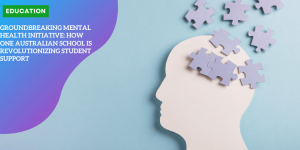Breaking Barriers: Adapting Cognitive Behaviour Therapy for Children with Special Needs
Historical Underutilization
Cognitive Behavioral Therapy (CBT) has long been considered the gold standard for treating anxiety in children, yet it’s been historically underutilized for those with intellectual disabilities (ID).
This oversight stems from the misconception that children with ID may lack the cognitive capacity to engage in the cognitive components of CBT.
However, experiences and innovations like those by Dr. Anastasia Hronis have shown that with appropriate adaptations, CBT can be effective for this group.
Importance of Adapting CBT
Adapting CBT for children with ID isn’t just beneficial; it’s essential.
Tailoring the therapy involves breaking down tasks, using visual and auditory aids, and simplifying language to ensure comprehension and engagement.
These modifications make CBT accessible, turning therapy into an achievable and impactful process for children with ID.
As we recognize the importance of adapting therapy to meet diverse needs, it becomes clear that no child should be left without support.
Building on this foundation, we continue to explore innovative programs and approaches designed with inclusivity in mind.
Understanding the Fearless Me Program
The “Fearless Me” program, developed by Dr. Anastasia Hronis, is a groundbreaking initiative aiming to make Cognitive Behavioral Therapy (CBT) accessible for children with intellectual disabilities (ID).
This program is crafted to bridge the gap in mental health services, historically underserved for this population.
Key Modules
The program encompasses three pivotal modules:
- Keep Calm: This module focuses on teaching relaxation and emotion regulation techniques, helping children manage their stress and calm their minds.
- Stop and Think: Here, children engage in identifying and challenging unhelpful thoughts. This critical thinking exercise empowers them to question and modify negative thinking patterns.
- Facing Fears: This module equips children with strategies to gradually confront their anxieties in a safe, controlled manner, facilitating their emotional resilience.
Accessibility
Importantly, the Fearless Me program is available free online, ensuring its broad reach and impact.
It employs various engaging methods like visual aids and repetition to cater to diverse learning needs, making it user-friendly for children with ID.
With these thoughtful adaptations, the program not only fosters essential coping skills but also nurtures a sense of empowerment among young users.
As we explore how these strategies actively reduce anxiety and other challenges, let’s see the program’s effectiveness.
Adapting CBT Techniques for Children with ID
Breaking Down Tasks
Adapting CBT for children with intellectual disabilities (ID) requires breaking down tasks into smaller, manageable components.
This approach helps children grasp concepts without feeling overwhelmed.
By simplifying steps, children can build confidence and engage with the therapy more effectively.
Use of Visual Aids and Repetition
Visual aids are vital in capturing children’s attention and enhancing understanding.
The use of materials like videos, cartoons, and other visual tools can make CBT more engaging.
Repetition solidifies learning, allowing children to revisit concepts multiple times until they feel comfortable.
Simplified Language and Text-to-Speech Functionality
Using short, simple sentences ensures that children with ID can easily follow along.
Incorporating text-to-speech functionality provides additional support, allowing children to hear instructions and information, which can aid in comprehension and retention.
These adaptations are pivotal in making CBT accessible and effective for children with ID, fostering an environment where they can thrive and learn at their own pace.
As we continue to explore the possibilities, it becomes clear that ongoing development and innovation in therapy methods are essential for meeting diverse needs.
Benefits and Effectiveness of Adapted CBT
Addressing Anxiety and Unhelpful Thinking
Adapting Cognitive Behavioral Therapy (CBT) for children with intellectual disabilities has proven to be a significant step forward.
By tailoring CBT strategies, children with ID can finally access therapeutic support specifically designed for their needs.
One major advantage is the program’s ability to address anxiety and unhelpful thinking patterns.
Many children with ID face anxiety that manifests in various behaviors.
The Fearless Me program helps them identify and challenge these patterns, transforming what was once an overlooked area of mental health care into an accessible option for many children.
Helping Children Face Their Fears
The incremental approach taken by the Fearless Me program empowers children to face their fears methodically.
By breaking tasks down into smaller, manageable steps and using modules like “Facing Fears,” children gradually build confidence.
They learn to confront anxiety-inducing situations at their own pace, ensuring they feel supported every step of the way.
This gradual exposure helps children not only in therapy but also equips them with skills applicable in everyday life.
Success in Various Settings
The effectiveness of these adaptations can be seen in both individual consultations and group therapy settings.
Schools have implemented the program, allowing children to learn in a familiar environment.
The approach is versatile, demonstrating success whether practiced one-on-one or in a group setting.
This flexibility ensures that more children can benefit from these tailored therapeutic techniques, promoting well-rounded development in children with ID.
As we continue exploring this vital approach to therapy, it’s crucial to keep expanding our understanding and application of programs like Fearless Me.
This ensures that we are providing the optimal support these children deserve.
Resources and Further Information
Child-Friendly Explanations
Explaining complex topics like intellectual disabilities (ID) and Cognitive Behavioral Therapy (CBT) in a way children can grasp is critical.
Dr. Anastasia Hronis, alongside Ian Kneebone, has published an article just for young audiences.
This article breaks down what an intellectual disability is, what CBT entails, and how the Fearless Me program came to be.
The language is simplified to ensure children understand their mental health journey without feeling overwhelmed.
Accessing the Fearless Me Program
The Fearless Me program, crafted specifically for youngsters with ID, is conveniently available online at no cost.
By visiting the program’s website, children and caregivers can easily access the resources at their own pace.
The platform utilizes features like visual aids, simple language, and text-to-speech to make learning engaging and accessible.
The Role of Ongoing Research
The importance of continuous research and development in adapting CBT for children with ID cannot be overstated.
New insights will enhance the effectiveness of programs like Fearless Me and ensure they remain relevant and impactful.
By pushing the boundaries of existing methodologies, professionals can better address the complex needs of this unique population.
Understanding and accessing these resources empowers children with intellectual disabilities and their caregivers, making strides toward overcoming barriers that have historically limited their access to mental health support.







